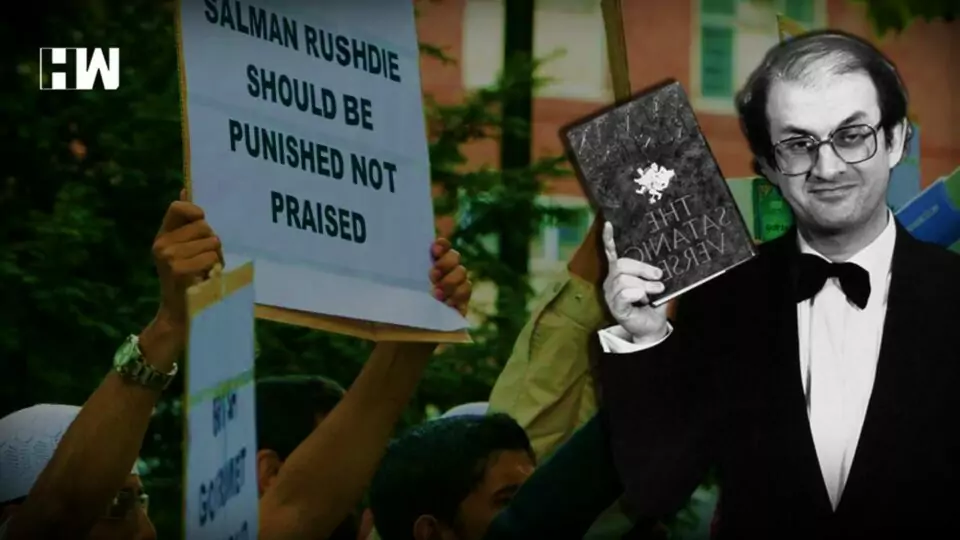The 1988 postmodernist novel The Satanic Verses, which was regarded as blasphemous by many in the Muslim world, has become the author’s most contentious work to date.
On Friday, of Muharram week at a function on the subject of naturally free speech, in New York, Salman Rushdie was stabbed and attacked. Famous novelist Salman Rushdie has been hiding his existence for more than 30 years since Iran’s supreme leader Ayatollah Ruhollah Khomeini issued a fatwa against him after the release of his contentious book “The Satanic Verses,” which Muslims deemed to be blasphemous.
The attack on the Indian origin Novelist has sent a shock wave in the entire world with several countries condemning the attack. Salman is now on a ventilator after being brutally stabbed. If reports are true, Salman may also lose one of his eyes. In a recent development, the attacker has been arrested.
Salman Rushdie, a supporter of free speech, has frequently received threats in his life because of his writing.
The 1988 postmodernist novel The Satanic Verses, which was regarded as blasphemous by many in the Muslim world, has become the author’s most contentious work to date.
The Decades-Old Controversy Revolving Around ‘Satanic Verse’
When the book was released in September 1988, it sparked debate both internationally and among Muslim communities.
Several Muslim nations promptly outlawed the book, and some even set it on fire during protests in the UK, Pakistan, and other places. The book continues to be prohibited in several nations, including the UAE, India, and Egypt.
Also Read: Author Salman Rushdie Stabbed, Now On Ventilator, Attacker Identified
Because it depicted a fictionalised version of the Prophet Mohammed and an interpretation of the Quran, the book is viewed as blasphemous by many Muslims.
According to some experts, it makes references to specific verses of the Quran that, in contrast to Islam’s stringent doctrine that there is only one God, permit prayers to be offered to three pagan goddesses.
Rushdie mentions a prophet who strongly resembles Muhammad, the founder of Islam, in the novel.
He claims that this prophet is duped into making a deal with Satan in which he trades some of his monotheistic dogmatism for reverence for the three goddesses. Then he realises his mistake.
According to Khomeini and others, he had an irreverent portrayal of the prophet.
The Fatwa On Salman Rushdie
On February 14, 1989, Khomeini of Iran issued a fatwa directing Muslims to murder Rushdie.
A fatwa can only be revoked by the same scholar who issued it, and Ruhollah Khomeini passed away the same year he made the call, according to History.com.
To gain the support of Muslims before elections, Rajiv Gandhi, the then-prime minister of India, prohibited the importation of the book in October 1988. Later, it was outlawed in almost 20 nations.
The Attacks On Translators And Publishers
The translators of “The Satanic Verses” have also encountered difficulties.
The novel’s Italian translator, Ettore Capriolo, was maimed in a stabbing in Milan in 1991.
Hitoshi Igarashi, a researcher, and translator of Rushdie’s book from Japanese was brutally murdered in 1991.
The book’s Norwegian publisher, William Nygaard, was shot three times in Oslo in 1993 but lived to tell the tale.
Post-Fatwa On Salman Rushdie
Rushdie used a false identity for ten years of his exile. At the time, he resided in the United Kingdom. The administration of former British Prime Minister Margaret Thatcher also provided him with round-the-clock police security.
In 1991, Rushdie began to emerge from his clandestine existence.
By 1998, Britain had assurances from Iran’s reformist administration led by President Mohammad Khatami that Iran would not carry out the fatwa.
However, Khomeini’s successor, Ayatollah Ali Khamenei, stated in 2015 that he still believed Rushdie was an apostate whose execution would be sanctioned by Islam.
TW: Disturbing Visuals
As an independent media platform, we do not take advertisements from governments and corporate houses. It is you, our readers, who have supported us on our journey to do honest and unbiased journalism. Please contribute, so that we can continue to do the same in future.

